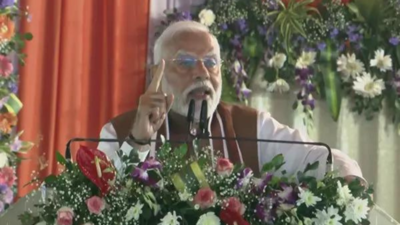
NEW DELHI; Prime Minister Narendra Modi on Wednesday laid the foundation stone for a new All India Institute of Medical Science (AIIMS) in Bihar’s Darbhanga.
PM Modi noted that the establishment of AIIMS in Darbhanga will significantly uplift the healthcare landscape of Bihar, serving not only local regions like Mithila, Kosi, and Tirhut but also benefiting patients from neighbouring West Bengal and Nepal.
He also highlighted the job opportunities that the new AIIMS would generate, contributing to the local economy.
“This facility will serve the people not only from Mithila, Kosi, and Tirhut regions but also from West Bengal and nearby areas. Even patients from Nepal will be able to receive treatment at this AIIMS hospital. The construction of AIIMS here will also create numerous new employment opportunities,” PM Modi said.
Addressing a gathering after the event, PM Modi said that this new AIIMS, alongside other developmental projects amounting to around Rs 12,100 crores, is part of a larger plan to improve healthcare accessibility and infrastructure across India.
“Our government is working with a holistic approach to healthcare in the country. Our first focus is on disease prevention. The second focus is on accurate diagnosis. The third focus is to ensure affordable and free treatment. Our fourth focus is to provide better healthcare facilities even in smaller towns. The fifth focus is to expand the use of technology in healthcare services,” he said.
PM Modi criticised previous administrations for their lack of commitment to addressing the healthcare needs of the poor. and credited Bihar chief minister Nitish Kumar for taking significant steps to change the healthcare scenario in the state.
“In the past, the situation was very challenging. There were very few hospitals and doctors, and medicines were very expensive. Previous governments remained entangled in promises and claims without any serious concern for the needs of the poor. Until Nitish took charge in Bihar, there was no serious concern for addressing these issues,” PM Modi said.
PM Modi underscored the importance of early disease detection, pointing out the establishment of over 1.5 lakh Ayushman Arogya Mandirs across India, which focus on diagnosing diseases like cancer and diabetes early. He highlighted the success of the Ayushman Bharat Yojanawhich has provided treatment for over four crore patients.
The Prime Minister also drew a comparison between the healthcare landscape of the past and present, pointing out that for decades after independence, there was only one AIIMS in Delhi, forcing patients to travel long distances for advanced treatment. He criticised the Congress government for their delayed execution in establishing more AIIMS facilities, claiming that it was his government that took decisive action to expand medical infrastructure nationwide.
“Our government has established new AIIMS in every corner of the country. Today, there are nearly two dozen AIIMS across the nation. In the past 10 years, the number of medical colleges has also doubled,” PM Modi added.
He further elaborated on his government’s efforts to improve medical education, mentioning the addition of one lakh new medical seats in the past decade and the plan to add 75,000 more in the coming years. The government has also introduced medical education in Hindi and other Indian languages, aiming to empower students from disadvantaged backgrounds to pursue careers in medicine.
PM Modi concluded his address by paying homage to the late folk singer Sharda Sinha, who recently passed away, acknowledging her contribution to spreading the cultural significance of Chhath festival through her music.
“The way she has spread the significance of the grand festival of Chhath through her songs across the world is truly remarkable,” PM Modi said.



















